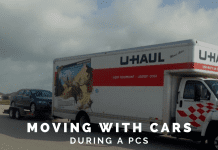Updates to the Coronavirus Stop Move Restrictions: There are still moves happening through the Exception to Policy (ETP). Right now, they are operating at 30% capacity compared to a normal year, but moves are still happening.
The GHC General Housing Contract has been awarded to Team ARC (American Rollon/Roll-off Carrier). This includes a group of companies including Mayflower, Suddoth, and others. We will have a future guest to discuss more about how this will impact military families starting in 2021.
Our Guest: Loni Steen is a Coast Guard spouse who has done solely PPM (Personally Procured Moves) throughout her husband’s 21 years of military service. She also served 6 years active-duty. They primarily chose do-it-yourself moves for money reasons. Their first move to Hawaii was a government move with a lot of damage, delays, and wet deliveries. The cost of repairs was a huge process, so after returning from Hawaii they decided to always move themselves.
“If you have the time and don’t mind putting in hard work, they are going to pay you up to 95% of what they would have paid a moving company to move you. You can put a lot of money in your pocket or pay off debt. It’s a lot of work, but it can be a financial benefit.”
WHAT DO FAMILIES NEED TO HAVE BEFORE GETTING APPROVED FOR A PPM?
Now during the pandemic, it may be beneficial to move yourself so you aren’t waiting on a moving company timeline or at risk of having your things stuck in a warehouse. If you want to do a PPM, you need your hard orders, and to log into DPM to set up your move. You need approval from the transportation office. Many are working with skeleton crews, so they may not be answering phones. Email them (you can find contact info on Move.mil). Once they approve your PPM, you can be reimbursed for the trucks, moving PODS, etc. Right now, you are getting 95% of costs to make the move happen.
WHAT SHOULD YOU EVALUATE BEFORE CHOOSING TO DO A PPM?
Crunch the numbers ahead of time. If you have moved before, compare what you moved with what you have bought since then. Check out the weight allowance for your service member’s rank. Then compare rates from moving truck companies (remember to include mileage costs!) with companies like PODS or U-Pack, which will help pack and deliver for you.
Also consider what help is available. Do you have friends and neighbors who can help you move on one or two days? Be prepared to share pizza/beer with them. Consider whether you have friends or acquaintances to help unload at the new location.
IF A FAMILY DECIDES TO HIRE A MOVING COMPANY, WHAT SHOULD THEY LOOK FOR TO MAKE THE MOVE SUCCESSFUL?
If you are going to hire a company on your own, make sure they are legit. Some companies pop up with a good-looking website and a low initial fee, but they are often scams. Last week we interviewed John Becker of AMSA. Their website has a list of movers and legitimate companies. Read reviews online, but beware that reviews can be people who work there and just want business. PCSgrades has moving company reviews written by military families, so you can see how they have handled other PCS moves.
Ask how they are charging you for your move. It should always be calculated by weight. Look at the contract to see when payments happen, what excess charges will be, etc. If you’re doing a PPM, look at the company’s insurance rates. The military covers $6 per pound and up to several thousand dollars. If you do a PPM, you are depending on the company’s liability clause. If something happens to the moving truck or a warehouse, know what your household goods are insured for.
WHAT MOVING SUPPLIES DO YOU NEED TO STOCK UP ON WHEN YOU MOVE YOURSELF?
Of course boxes, packing paper, bubble wrap, etc. Save money by scrolling through local Facebook pages to see when people are getting rid of moving boxes. Instead of getting too much packing material, use towels, clothes, and bedsheets to wrap breakable items. You can be very specific about what is in each box, so be very specific about what is in the box if you are shoving things into random boxes. Always keep your uniforms with you so the service member can report to work right away.
Packing seems overwhelming, but set a goal of a few boxes each day. Start with pictures and knick-knacks because they can be packed weeks in advance. That’s a good way to make a dent quickly! Focus on the medium sized boxes because they break everyone’s back and are too bulky. Remember to pack last whatever you are going to need first. Pro tip: pack toilet paper, cleaning supplies, and coffee maker in that first day box. Mattresses can go last so you can throw them on the floor and get some good sleep while you are unpacking.
WHAT UP-FRONT COSTS WILL BE COVERED FOR A PPM? HOW CAN WE OFF-SET THE COSTS?
Government travel cards can be used for some PCS expenses (always double check with your branch’s finance office). Dislocation allowance (DLA) can be paid as a partial advance before your move to help offset initial costs. The reimbursement rate is at 95%, based on your weight and your service member’s rank. They want this to cover all your costs, but things like packing materials won’t be included. You can claim some of those costs on your taxes.
PROS AND CONS OF A PARTIAL PPM VS A FULL PPM?
Almost everyone ends up doing some type of partial, unless you are actually packing a moving truck and driving it yourself. If you drive, you get some distance for your car and whatever you packed into it. Your weight will not be as significant as the full PPM. If you drive your own vehicles and use a U-Haul across country, check if your cars can be towed by the U-Haul. You get the mileage and weight reimbursement for the vehicles and the trailer.
If you’re just doing a partial with a few keepsake items in your car, then you get to keep control of those items. Firearms, sentimental things, cleaning supplies, kid and pet essentials–these are all things you will have in your vehicle and can claim on the partial PPM. You weigh your vehicle empty, load it up, then go weigh it full, and you will make some money off it.
IS THE REIMBURSEMENT TAXED?
Yes, it is taxable income. They don’t reimburse dollar per dollar, so you can still use your receipts as a tax write-off. The PPM reimbursement is based on the mileage and the weight, so it changes depending how much each person is reimbursed. The rank and number of dependents are also factored in for each family. The 95% reimbursement rate has been in place for years (since about 2012), and that is the same rate used DoD-wide.
IF YOU TOW A BOAT ON A TRAILER, CAN YOU COUNT THAT TOWARD THE WEIGHT?
The weight of the boat may not be included, but you can fill the boat with things and use that to count towards the weight. But be careful if you have things unsecured in a boat, and you are stopping at restaurants or hotels. The DTR (Defense Travel Regulation) discusses regulations for boats and motorcycles.
WHAT DO YOU WISH YOU KNEW BEFORE DOING A PPM?
You learn more with each move, and there are always better ways to stay organized and cut corners. You want to think carefully about keeping cleaning supplies and mattresses in an easily accessible place, and label everything very carefully. Cleaning the place you move out of can be very time-consuming. Military housing often has a long cleaning checklist, so plan at least a day for that during the moving process. Be organized and use lots of checklists for yourself.
WHAT POLICIES SHOULD MILITARY FAMILIES KNOW?
Have your hard orders and the approval from the transportation office for your PPM. If you haven’t done the counseling and approval, you will not get reimbursed. Know that weight tickets (empty and full) are essential for getting reimbursed. It has to be a certified ticket from a weigh station. Crunch the numbers for your own family to make sure it will be worthwhile. You can get an estimate through Move.mil or your local transportation office. If you use a U-Pack Truck, make sure you get the weight tickets before and after. It’s more expensive than U-Haul, but factor in all the additional costs and hassle of driving a moving truck yourself across the country. Factor in all the logistics of gas stations and hotels if you are planning to drive yourself.











